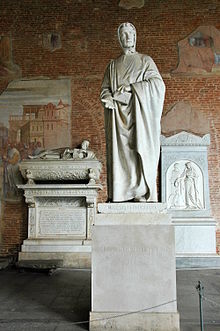Our website is made possible by displaying online advertisements to our visitors.
Please consider supporting us by disabling your ad blocker.
Fibonacci
Fibonacci | |
|---|---|
 Statue of Fibonacci (1863) by Giovanni Paganucci in the Camposanto di Pisa[a] | |
| Born | c. 1170 |
| Died | c. 1250 (aged 79–80) Pisa, Republic of Pisa |
| Other names |
|
| Occupation | Mathematician |
| Known for |
|
| Parent | Guglielmo "Bonacci" (father) |
Fibonacci[b] (/ˌfɪbəˈnɑːtʃi/,[4] also US: /ˌfiːb-/;[5][6] Italian: [fiboˈnattʃi]; c. 1170 – c. 1240–50)[7] was an Italian mathematician from the Republic of Pisa, considered to be "the most talented Western mathematician of the Middle Ages".[8]
The name he is commonly called, Fibonacci, was made up in 1838 by the Franco-Italian historian Guillaume Libri[9][10] and is short for filius Bonacci ('son of Bonacci').[11][c] However, even earlier, in 1506, a notary of the Holy Roman Empire, Perizolo mentions Leonardo as "Lionardo Fibonacci".[12]
Fibonacci popularized the Indo–Arabic numeral system in the Western world primarily through his composition in 1202 of Liber Abaci (Book of Calculation)[13][14] and also introduced Europe to the sequence of Fibonacci numbers, which he used as an example in Liber Abaci.[15]
- ^ "Fibonacci's Statue in Pisa". Epsilones.com. Archived from the original on 2014-02-22. Retrieved 2010-08-02.
- ^ Smith, David Eugene; Karpinski, Louis Charles (1911), The Hindu–Arabic Numerals, Boston and London: Ginn and Company, p. 128, archived from the original on 2023-03-13, retrieved 2016-03-02.
- ^ a b Livio, Mario (2003) [2002]. The Golden Ratio: The Story of Phi, the World's Most Astonishing Number (First trade paperback ed.). New York City: Broadway Books. pp. 92–93. ISBN 0-7679-0816-3. Archived from the original on 2023-03-13. Retrieved 2018-12-19.
- ^ "Fibonacci, Leonardo". Lexico UK English Dictionary. Oxford University Press. Archived from the original on 2021-05-12.
- ^ "Fibonacci series" Archived 2019-06-23 at the Wayback Machine and "Fibonacci sequence". Collins English Dictionary. HarperCollins. Archived from the original on 12 June 2012. Retrieved 23 June 2019.
- ^ "Fibonacci number". Merriam-Webster.com Dictionary. Merriam-Webster. Retrieved 23 June 2019.
- ^ MacTutor, R. "Leonardo Pisano Fibonacci". www-history.mcs.st-and.ac.uk. Archived from the original on 2019-10-28. Retrieved 2018-12-22.
- ^ Eves, Howard. An Introduction to the History of Mathematics. Brooks Cole, 1990: ISBN 0-03-029558-0 (6th ed.), p. 261.
- ^ Devlin, Keith (2017). Finding Fibonacci: The Quest to Rediscover the Forgotten Mathematical Genius Who Changed the World. Princeton University Press. p. 24.
- ^ Colin Pask (7 July 2015). Great Calculations: A Surprising Look Behind 50 Scientific Inquiries. Prometheus Books. p. 35. ISBN 978-1-63388-029-0. Archived from the original on 13 March 2023. Retrieved 19 January 2020.
- ^ Keith Devlin, The Man of Numbers: Fibonacci's Arithmetic Revolution, A&C Black, 2012 p. 13.
- ^ Drozdyuk, Andriy; Drozdyuk, Denys (2010). Fibonacci, his numbers and his rabbits. Toronto: Choven Pub. p. 18. ISBN 978-0-9866300-1-9. OCLC 813281753. Archived from the original on 2020-02-17. Retrieved 2020-01-26.
- ^ "Fibonacci Numbers". www.halexandria.org. Archived from the original on 2019-10-13. Retrieved 2015-04-29.
- ^ Leonardo Pisano: "Contributions to number theory" Archived 2008-06-17 at the Wayback Machine. Encyclopædia Britannica Online, 2006. p. 3. Retrieved 18 September 2006.
- ^ Singh, Parmanand. "Acharya Hemachandra and the (so called) Fibonacci Numbers". Math. Ed. Siwan, 20(1):28–30, 1986. ISSN 0047-6269
Cite error: There are <ref group=lower-alpha> tags or {{efn}} templates on this page, but the references will not show without a {{reflist|group=lower-alpha}} template or {{notelist}} template (see the help page).
Previous Page Next Page


